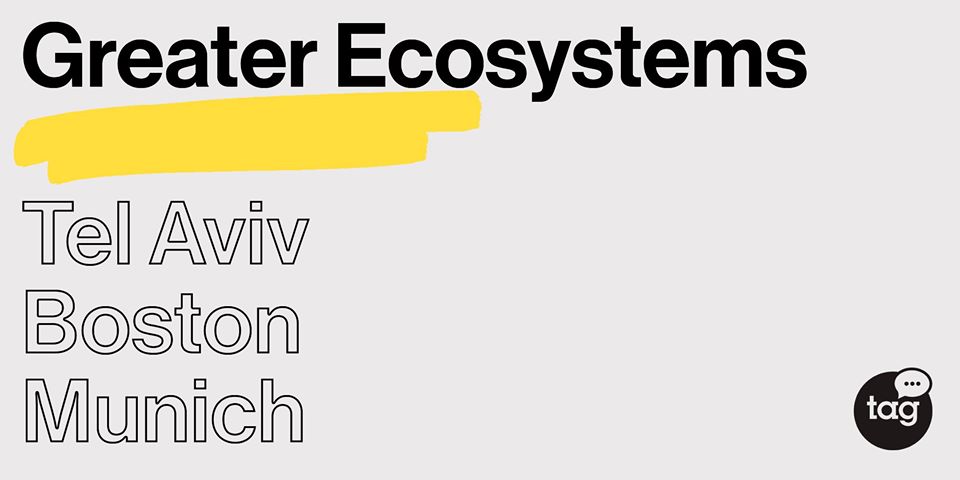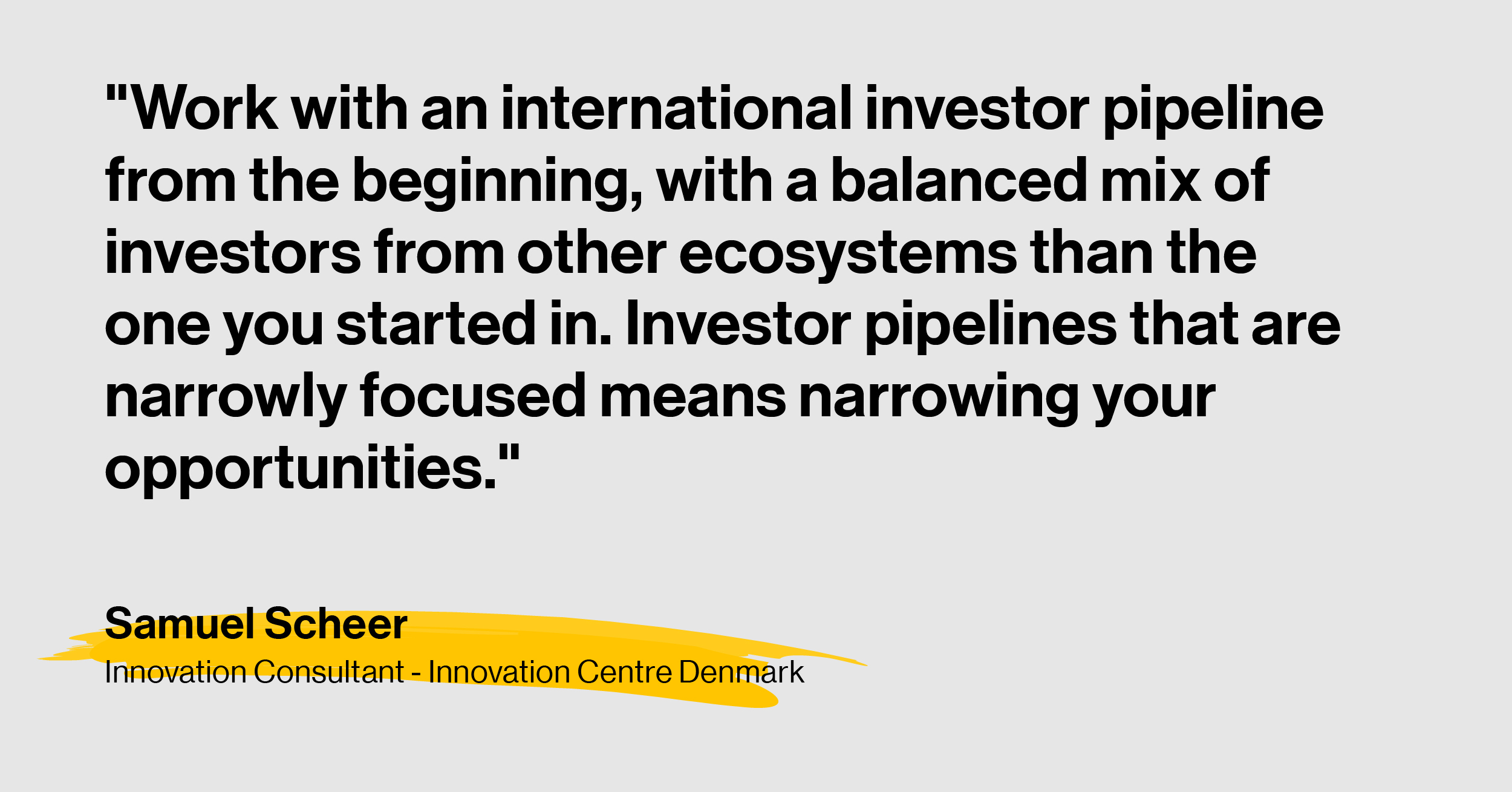Startup
8
min read
Danish Startups Going Global: Vital learnings from Boston, Munch and Tel Aviv


Don't you want to read? Try listening to the article in audio mode 🎧
They say that the trouble with good advice is that it interferes with our plans. During our webinar on June 4th, a collaboration between Innovation Center Denmark and Talent Garden Rainmaking, while we listened to wise words from three different corners of the world - Boston, Munich and Berlin - we made sure this wasn’t so.
The mission behind the collaboration between ICDK and Talent Garden Rainmaking is to support talented Danish startups in growing their businesses globally. While we wait for our innovation camps to take place, we have asked our experts from these spots to share their most valuable learnings with us.



Learnings from Boston:
Entering the US market as a startup Alexandre Blanchot & Torben Orla Nielsen- ICDK Boston
Mind your reputation
From Boston, we learned that reputation is key for startup founders who want to enter the US. It is a fiercely competitive market where word spreads fast, so if you have a customer and the pilot fails, it will be tricky for you to find another client - particularly in Boston, where the key players tend to know each other. Entering the US as a startup is also a cash-burning process, you should only do it when your product has gained a certain level of maturity and when you have a few US customers onboard already. Again, the goal is to show a credible track record and this can only be done through on-site references.Be patient
Having partners in the US requires a lot of time and patience. Being in situ is almost a must, and the person you send to that first meeting should be dressed to impress. Ideally, this would be the CEO or a senior board member. Social access in Boston and the US at large can be easy and informal, and it is not unusual to bump into an executive from Pfizer in a local bar. When that happens, make sure you don’t have the barrier of a lack of title. Despite these challenges, the current global state of urgency opens up for new opportunities. If a company has a specific challenge today, and you think you can solve it with your technology, you can create and fast-track a partnership in two months.Do your homework
You need to be mindful that entering an ecosystem like Boston means intense competition for attention and talent. Being aware of exactly what it is you bring to the table, as well as meticulously performed research, can help you get ahead. The latter becomes more and more important, as many stakeholders in the Boston ecosystem possess a scientific background. They understand your product in-depth and know how to challenge it. When meeting these people, you need to be reliable and ambitious and not over-promise.Learnings from Munich:
Corporate-startup partnerships
Jesper Christrup Jensen & Jon Frederik Pers - ICDK Munich
A corporate partnership rarely stands alone
Timing-wise, a startup-corporate partnership should not be thought of as a replacement for investment partners. Rather, there will often be a synergy, where the corporate partnership gives you a stamp of approval, so the funding process becomes easier. It should be two parallel lanes of work, where the corporate partnership creates long term gains and the investment partner provides you with the capital you need for immediate growth activities and operations.New opportunities in a traditional market
The car industry, which has shaped much of Munich’s ecosystem, has traditionally been a hermetic world, difficult to enter for anyone who is not a major player. Now, we are seeing an opening for startups who may play the role as a change agent, as they help established players adapt to new customer needs, for instance, by connecting the car and the home as one smart user experience. Startups that think originally about connectivity products that can be implemented by the corporate are very interesting at the moment. Entrepreneurs in Munich should also explore the corporate category of hidden champions, i.e. large, successful companies, whose brand name you do not necessarily recognize. Many of these are looking to outsource part of their research and development activities to startups. They know that startups have a bigger chance of developing the technology they will need long-term. One thing that may surprise some founders, is that corporates in the Munich ecosystem are very technology curious. It might be a leftover from Germany’s tradition as a hardware country. If you are making an innovative screw, it will always be interesting to them, even if your business model is not validated yet.Building the relationship
In terms of building a relationship with a corporate, there are several things worth keeping in mind:- The bigger the brand, the more you will have to make peace with the fact that the corporate sets the overall framework for the partnership. It is a competitive space, and they have plenty of startups to choose from.
- Preparing - and over-preparing too - is important before you reach out to them: Think through why they need your product/skillset and where it should be implemented in the overall value chain. There are at least ten startups in the German ecosystem doing something similar to you, but they might not have thought through these potential links to the corporate.
- A corporate accelerator or incubator, which most of them have, can be the first foot in the door. It is good to have basic visibility in your own ecosystem before you reach out to them.
- As always, you have to be completely clear on your USP, because the overall business climate is cost-conscious. At the moment, no one is looking for a nice-to-have startup partnership.
Learnings from Tel Aviv:
The ins and outs of funding
Samuel Scheer - ICDK Tel Aviv

Think international
Work with an investor pipeline from the beginning, with a balanced mix of investors from other ecosystems than the one you started in. I still see investor pipelines that are narrowly focused on the home market of the startup. This just narrows your opportunities. Comparable to, for instance, the Danish ecosystem, investors in Tel Aviv are looking outwards from the beginning. They would never bet on a startup focused on selling to the home market solely.Cultivate a sense of urgency
If an investor in Tel Aviv says ‘send me your deck’, it means right away, not a week from now. So on the one hand, you need to be ready for a fast pace in each interaction, but at the same time plan that relationship-building with an investor, from first dialogue to a funding agreement, is a 6-18 month process.Timing is everything
If you are in the early stages - pre-seed or seed-stage - the Tel Aviv ecosystem can play a role if you have your IP in Israel. Especially if you are a pharmaceutical or medical startup. In this stage, you can form important parts of your network (for later funding) by being part of a local accelerator. Without any kind of clear connection to Tel Aviv, an investor has no motivation to complicate his deal flow by investing in you. As a startup further down the round - looking to raise a series a, b or c round - you need to find out: How do I get an intro to a Tel Aviv-based VC fund? This could be through a partner from another fund or alternatively a founder in one of the fund’s existing portfolio companies. The big ones, like Jerusalem Venture Partners, have no challenge in terms of the deal flow itself, but qualifying and validating the deal flow is still where they spend much of their time. This is why personal introductions and recommendations matter.Funding post Covid-19
Although it is a tough time for most, there are startups whose growth has been accelerated by the crisis. These are the ones most attractive to investors right now. For instance, telemedicine, which comes with its own challenges of user adoption and system adoption. Startups that rethink the physical customer meeting, which has become problematic on the tail of the crisis, are in general interesting to investors. A category like remote learning experiences a peak of interest too. In general, investors are thinking beyond the crisis, which is why, for instance, startups within telemedicine have an advantage at the moment in terms of securing funding. These are companies that deliver an infrastructure the buyers will rely on in the long run.Have a roadmap
You should make a priority list of 10 investors and then make a point of coming to Tel Aviv to start building those relationships. It’s not a one-time touch and go. In Tel Aviv, people think about business relationships as - ideally - lifelong, not as transactional things. These relationships can be about the exchange of knowledge too. Look for investors that have worked with companies in your industry, but at a later stage. This person is ten steps ahead of you and will know about what made your peer companies grow, and the talent you need to scale. For the funding work to make sense on your priority list (it is time-consuming), it helps to also think about it as a resource of learning. Building a good relation to a topnotch VC can also be an entry point to sales in your industry. A cybersecurity-focused VC with 20 years of experience knows everyone and can, for instance, give you the right lead into a major corporate customer, which otherwise would take you much longer to land.Innovation Centre Denmark creating valuable connections in Israel
Tel Aviv is one of the world’s leading B2B SaaS startup hubs that has a profound ecosystem of entrepreneurs, venture capital and established companies with amazing opportunities for Danish Startups. And Innovation Centre Denmark supports the development of business models and establishing partnerships in Israel, giving Danish startups access to world-leading knowledge. During an Innovation Camp, Innovation Centre Denmark will provide twelve selected Danish tech startups with the opportunity to participate in the B2B SaaS Enterprise Innovation Camp, a truly unique forum to exchange with Israeli venture capitalists, corporates and serial entrepreneurs. This far-reaching and in-depth Innovation Camp will take place in person at Talent Garden Rainmaking in Copenhagen, the home to a large community of digital and tech entrepreneurs. The program will have live online sessions connecting participants with the vibrant startup scene in Tel Aviv.Empowering Danish B2B Saas Startups entering the Israeli Market
The Innovation camp will have you walking away with meaningful connections in the Israeli tech ecosystem through interacting with leading corporates, business angels and VCs that could serve as board members, customers or investors in the future. Other incredible highlights from the B2B SaaS Enterprise Innovation Camp:- You will gain a clear understanding of what your startup needs to achieve to get funding from internationally acclaimed business angels, venture capitalists or corporate VCs.
- Discover extensive insights from experienced Israeli founders into how to scale your company globally from Denmark as you advance.
- Meet with potential customers in your vertical and have a roadmap for what it takes to close any prospects.
- Be exposed to all the potential ways of how a sustainable collaboration with Israel will work and explore in detail the Israeli B2B technology ecosystem.
- Make close ties and connect with new peers for exchanging thoughts, ideas and mentorship who will stay with you for many years to come.
- Learn how to increase your media & marketing exposure in order to be in touch with potential customers and venture capitalists.
- And walk away with greater ambitions and greater and skill.
Article updated on: 09 August 2023

Don't Waste Your Talent. Turn It Into a Career With a Course That Fits Your Needs!
Talent Garden is your Digital Skills Academy, offering courses in Digital Marketing, UX Design, Digital HR and Data Analysis designed to launch your career.
Keep reading

5
min read
The Definitive Guide to Digital Product Management
With the fast advancements in digital technology, we are all facing rapid change from our personal lives but also in ...
Talent Garden
18/09/2020

6
min read
The Ultimate Guide to Artificial Intelligence
Everything points to the fact that Artificial Intelligence will transform our future in a more radical way than any ...
Talent Garden
26/11/2018

4
min read
Project management in a digital world interview with Anna Cappi
Today, we are sitting down with Anna Cappi to talk more about Project Management - the ever-growing job role that seems ...
Talent Garden
19/08/2020

2
min read
The Talent Garden Innovation School's Referral Program: what it is and how to apply
The Referral Program is an initiative designed to expand our community of digital innovators, bringing benefits to both ...
Talent Garden
22/06/2021
